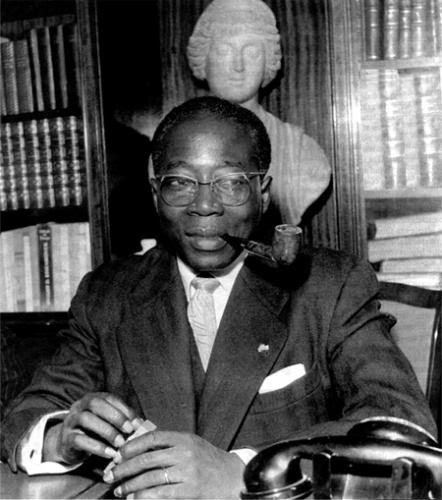Leopold Senghor

9 October: LS born in Joal, Senegal. His father was a prosperous cattle breeder and peanut grower, a member of the Christian minority in a predominantly Muslim country.
LS admitted to a Catholic boarding school at Ngazobil, where he studies French and Wolof. He is also exposed to the French policy of assimilating gifted natives — in language and attitudes, the French tried to turn them into African Frenchmen through a curriculum based entirely on European civilization. LS is a brilliant student, and he is so devout that he resolves to become a Catholic priest.
Enters the seminary in Dakar. However, the French principal exhibits racist attitudes which clash with LS's outspokenness.
LS moves to the secular French lycée (academic secondary school) in Dakar, from which he graduates in 1928. His outstanding record wins him prizes and a scholarship to the elite Lycée Louis-le-Grand in Paris.
LS meets the Martinican poet Aimé Césaire and the French Guianan poet Léon Gontran Damas, two men who will later help Senghor form his philosophy of Négritude.
LS earns his bachelor's degree from the University of Paris.
Receives the University of Paris' highest degree, agrégation de grammaire. First African to get the degree.
Begins military service.
Begins teaching in various lycées in France.
Négritude: this was a literary and political movement which opposed colonialism, denounced Europe's lack of humanity, and rejected Western domination and ideas. It also focused on accepting and taking pride in being black and valorized African history, traditions, and beliefs. Most literature was written in a realistic style which was underpinned by concerns for the disenfranchised, the poor, and those who have no voice.
WWII. Enlists in the Fench colonial infantry.
Becomes a German POW.
Released from POW camp due to health reasons. Confined to Paris. He resumes his teaching career at increasingly prestigious institutions while engaging in French Resistance activities.
Elected representative from Senegal to the French Constituent Assembly.
Official Grammarian for the drafting of a new French Constitution.
Divorces from Ginette Eboué.
Marries Colette Hubert.
Again Official Grammarian for the drafting of a new French Constitution.
Elected President of newly-independent Senegal.
Senghor's record as chief of state was not all positive. Political power struggles and his occasional suppression of opposition parties, a huge and wasteful bureaucracy that accumulated because of patronage, a faltering economy, and Senghor's inability to galvanize the masses with his philosophy of Négritude were some of the reasons for this. To the end of his political career, Senghor continued to advocate an African road to socialism, which he explained as a middle position between individualism and collectivism, one promoting universal humanism.
Resigns the Presidency.
Invested as the first African member of the French Academy, the forty "immortals."
UNESCO has a 3-day world-wide celebration of his 90th birthday.
Dies.